#is empress xuan
Text
anybody else still thinking about lltg?
#lltg#love like the galaxy#I’m still not over the women#it’s like they thought to themselves#*history is hella misogynist#let’s see if we can take the tripe from history#and humanize them#100 percent here for the friendship between empresses yue and xuan#loved seeing 5 th princess at her m9ms funeral#the one decision I really didn’t like but am not comfortable enough with Chinese pop culture to really make a statement about#is empress xuan#in rl she’s based on a 2nd century empress#but in real life that crown prince went to rule yan and the empress was well respect3d for the rest of her life#so maybe I’m missing something#feels a lot like they wanted her to die of sadness#because she could never achieve one man’s pure love#this is the skeptic coming out#why are you steering so hard into the patriarchy ch8na#and why is css letting her#if she’s depressed put her in the sun#also Huo jun lby’s aunt hat a fucking great character#I love it when a sympathetic character also suuuuucks
20 notes
·
View notes
Text
#mxtx#mdzs#mo dao zu shi#tian guan ci fu#jiang yanli#yu ziyuan#luo qingyang#wen qing#Empress Xianle#ling wen#ban yue#xuan ji#wang lingjiao
12 notes
·
View notes
Text





Cdrama: The Rebel Empress (2024)
Gifs of Intro of cdrama "The Rebel Empress"
【Multi-sub】 A Beauty's Plan EP01 | Yu Xuanchen, Shao Yuqi, Wu Qianxin | 美人谋 | Fresh Drama
Watch this video on Youtube: https://www.youtube.com/watch?v=gbi91JPZlNg
#The Rebel Empress#美人谋#A Beauty's Plan#Mei Ren Mou#美人謀#2024#Tencent Video#WeTV#youtube#cdrama#chinese drama#episode 1#1st episode#Yu Xuan Chen#Shao Yu Qi#Zeng Xi Tang#Wu Ming Xuan#Zhou Rong Qian#Wang Yi Nan#Wang Hong Qian#Bai Ru#Terma Tong#Xue Bin
1 note
·
View note
Text
[Upcoming fanservants who've infected my brain:]

Empress Xuan
The White Death


Regal Resolution
#aria of the starless sky || ooc#empress xuan || sima yi#the white death || simo häyhä#regal resolution || memnon
4 notes
·
View notes
Text
[Hanfu · 漢服]Chinese Western Han (202 BC – 9 AD) Traditional Clothing Hanfu Photoshoot
“这个位子 我有何坐不得?”
“我欲问鼎天下,试问谁与争锋”
"Why can't I sit in this seat?"
"I want to conquer the world, who can compete with me?"
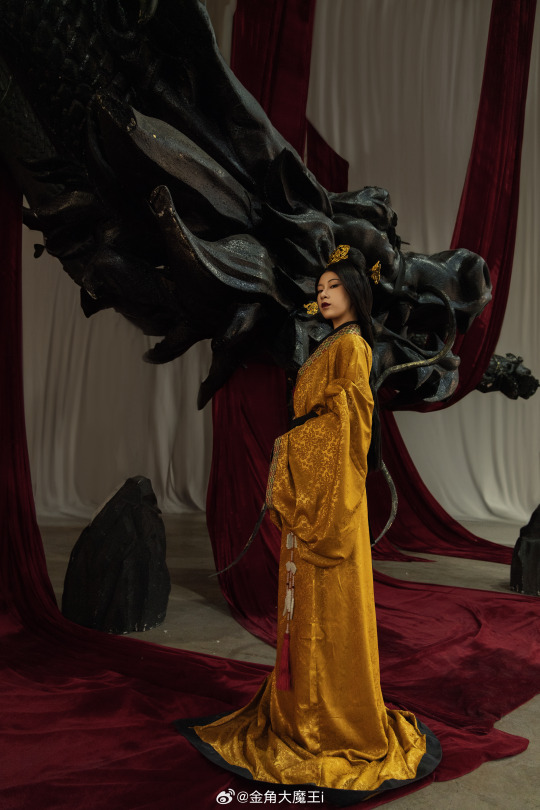
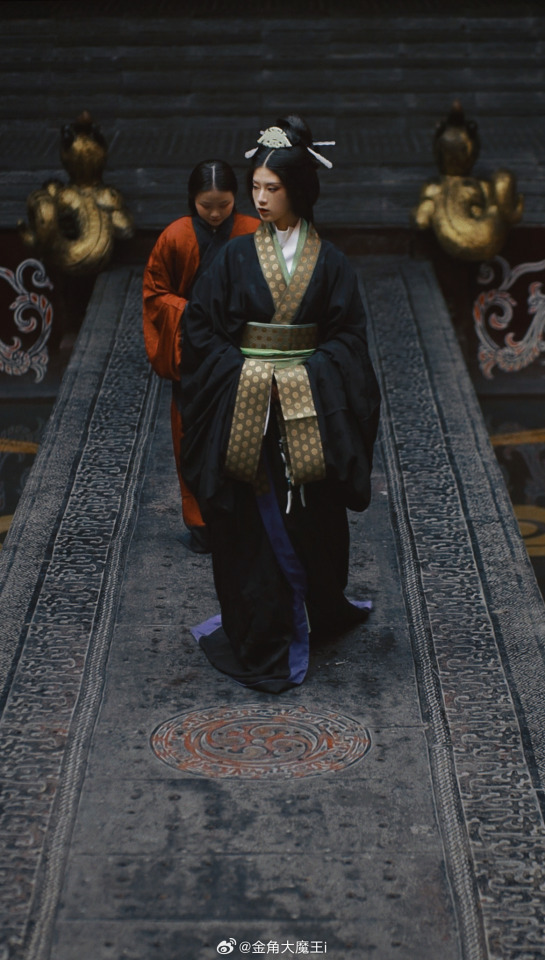
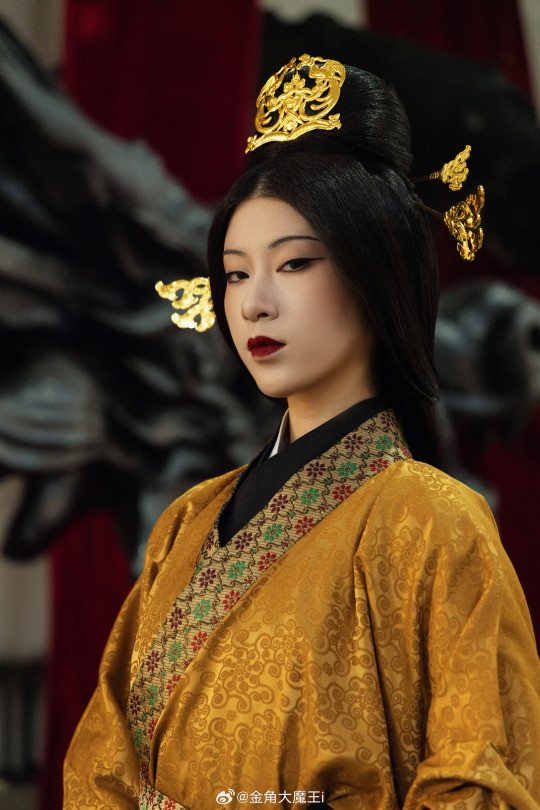
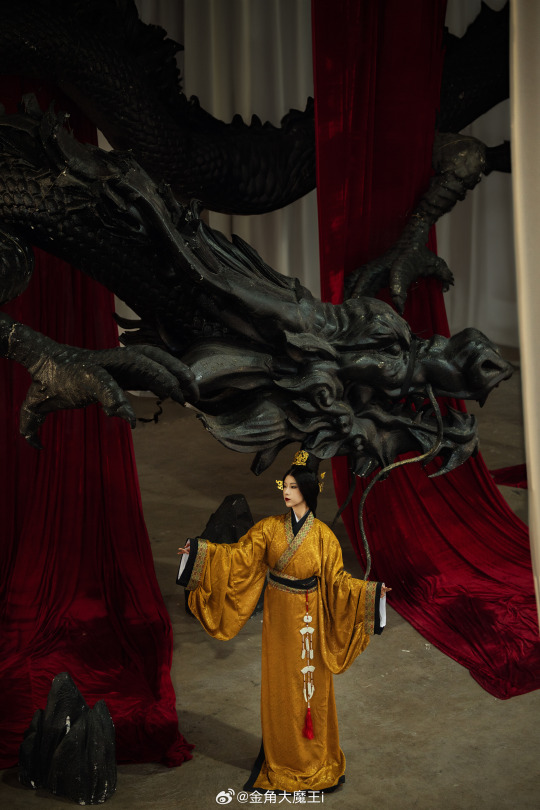

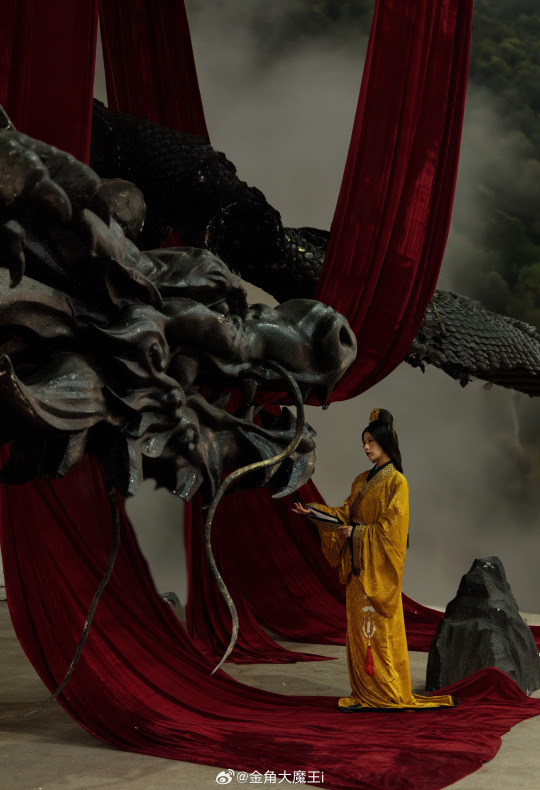


【About The First Empress of the Han Dynasty Empress Lü:Lǚ zhì(吕雉)】
Lü Zhi (241–18 August 180 BC), courtesy name E'xu (娥姁) and commonly known as Empress Lü (traditional Chinese: 呂后; simplified Chinese: 吕后; pinyin: Lǚ Hòu) and formally Empress Gao of Han (漢高后; 汉高后; Hàn Gāo Hòu), was the empress consort of Gaozu, the founding emperor of the Han dynasty. They had two known children, Liu Ying (later Emperor Hui of Han) and Princess Yuan of Lu. Lü was the first woman to assume the title Empress of China and paramount power. After Gaozu's death, she was honoured as empress dowager and regent during the short reigns of Emperor Hui and his successors Emperor Qianshao of Han and Liu Hong (Emperor Houshao).
She played a role in the rise and foundation of her husband, Emperor Gaozu, and his dynasty, and in some of the laws and customs laid down by him. Empress Lü, even in the absence of her husband from the capital, killed two prominent generals who played an important role in Gaozu's rise to power, namely Han Xin and Peng Yue, as a lesson for the aristocracy and other generals. In June 195 BC, with the death of Gaozu, Empress Lü became, as the widow of the late emperor and mother of the new emperor, Empress Dowager (皇太后, Huángtàihòu), and assumed a leadership role in her son's administration. Less than a year after Emperor Hui's accession to the throne, in 194 BC, Lü had one of the late Emperor Gaozu's consorts whom she deeply hated, Concubine Qi, put to death in a cruel manner. She also had Concubine Qi's son Liu Ruyi poisoned to death. Emperor Hui was shocked by his mother's cruelty and fell sick for a year, and thereafter no longer became involved in state affairs, and gave more power to his mother. As a result, Empress dowager Lü held the court, listened to the government, spoke on behalf of the emperor, and did everything (臨朝聽政制, "linchao ting zhengzhi"). With the untimely death of her 22-year-old son, Emperor Hui, Empress dowager Lü subsequently proclaimed his two young sons emperor (known historically as Emperor Qianshao and Emperor Houshao respectively). She gained more power than ever before, and these two young emperors had no legitimacy as emperors in history; the history of this 8-year period is considered and recognized as the reign of Empress Dowager Lü. She dominated the political scene for 15 years until her death in August 180 BC, and is often depicted as the first woman to have ruled China. While four women are noted as having been politically active before her—Fu Hao, Yi Jiang, Lady Nanzi, and Queen Dowager Xuan—Lü was the perhaps first woman to have ruled over united China.
Lü Zhi was born in Shanfu County (單父; present-day Shan County, Shandong) during the late Qin Dynasty. Her courtesy name was Exu (Chinese: 娥姁; pinyin: Éxǔ). To flee from enemies, her father Lü Wen (呂文) brought their family to Pei County, settled there, and became a close friend of the county magistrate. Many influential men in town came to visit Lü Wen. Xiao He, then an assistant of the magistrate, was in charge of the seating arrangement and collection of gifts from guests at a banquet in Lü Wen's house, and he announced, "Those who do not offer more than 1,000 coins in gifts shall be seated outside the hall." Liu Bang (later Emperor Gaozu of Han), then a minor patrol officer (亭長), went there bringing a single cent and said, "I offer 10,000 coins." Lü Wen saw Liu Bang and was so impressed with him on first sight, that he immediately stood up and welcomed Liu into the hall to sit beside him. Xiao He told Lü Wen that Liu Bang was not serious, but Liu ignored him and chatted with Lü. Lü Wen said, "I used to predict fortunes for many people but I've never seen someone so exceptional like you before." Lü Wen then offered his daughter Lü Zhi's hand in marriage to Liu Bang and they were wed. Lü Zhi bore Liu Bang a daughter (later Princess Yuan of Lu) and a son, Liu Ying (later Emperor Hui of Han).
Liu Bang later participated in the rebellion against the Qin Dynasty under the insurgent Chu kingdom, nominally-ruled by King Huai II. Lü Zhi and her two children remained with her father and family for most of the time during this period.
Even after Emperor Gaozu (Liu Bang)'s victory over Xiang Yu, there were still unstable areas in the empire, requiring the new government to launch military campaigns to pacify these regions thereafter. Gaozu placed Empress Lü Zhi and the crown prince Liu Ying (Lü Zhi's son) in charge of the capital Chang'an and making key decisions in court, assisted by the chancellor Xiao He and other ministers. During this time, Lü Zhi proved herself to be a competent administrator in domestic affairs, and she quickly established strong working relationships with many of Gaozu's officials, who admired her for her capability and feared her for her ruthlessness. After the war ended and Emperor Gaozu returned, she remained in power and she was always influential in many of the country's affairs.
In his late years, Emperor Gaozu started favouring one of his younger consorts, Concubine Qi(戚夫人), who bore him a son, Liu Ruyi, who was instated as Prince of Zhao in 198 BC, displacing Lü Zhi's son-in-law Zhang Ao (Princess Yuan of Lu's husband). Gaozu had the intention of replacing Liu Ying with Liu Ruyi as crown prince, reasoning that the former was too "soft-hearted and weak" and that the latter resembled him more. Since Lü Zhi had strong rapport with many ministers, they generally opposed Gaozu's decision but the emperor seemed bent on deposing Liu Ying. Lü Zhi became worried and she approached Zhang Liang for help, and the latter analysed that Gaozu was changing the succession on grounds of favouritism. Zhang Liang invited the "Four Whiteheads of Mount Shang", a group of four reclusive wise men, to persuade Gaozu to change his decision. The four men promised to assist Liu Ying in future if he became emperor, and Gaozu was pleased to see that Liu Ying had their support. Gaozu told Concubine Qi, "I wanted to replace (the crown prince). Now I see that he has the support of those four men; he is fully fledged and difficult to unseat. Empress Lü is really in charge!" This marked the end of the dispute over the succession and affirmed Liu Ying's role as crown prince.
In June 195 BC, Emperor Gaozu died and was succeeded by Liu Ying, who became historically known as Emperor Hui of Han. Lü Zhi was honoured by Emperor Hui as empress dowager. She exerted more influence during the reign of her son than she had when she was empress, and she became the powerful and effective lead figure in his administration.
Lü Zhi did not harm most of Gaozu's other consorts and treated them according to the rules and customs of the imperial family. For example, consorts who bore male children that were instated as princes were granted the title of "Princess Dowager" (王太妃) in their respective sons' principalities. One exception was Concubine Qi, whom Lü Zhi greatly resented because of the dispute over the succession between Liu Ruyi (Qi's son) and Liu Ying. Liu Ruyi, the Prince of Zhao, was away in his principality, so Lü Zhi targeted Concubine Qi. She had Qi stripped of her position, treated like a convict (head shaved, in stocks, dressed in prison garb), and forced to do hard labour in the form of milling rice.
Roles in the deaths of Concubine Qi and Liu Ruyi
Lü Zhi then summoned Liu Ruyi, who was around the age of 12 then, to Chang'an, intending to kill him together with his mother. However Zhou Chang (周昌), the chancellor in Liu Ruyi's principality, whom Lü Zhi respected because of his stern opposition to Emperor Gaozu's proposal to make Liu Ruyi crown prince, temporarily protected Liu Ruyi from harm by responding to Lü Zhi's order that, "The Prince of Zhao is ill and unfit for travelling over long distances." Lü Zhi then ordered Zhou Chang to come to the capital, had him detained, and then summoned Liu Ruyi again. Emperor Hui tried to save Liu Ruyi by intercepting his half-brother before the latter entered Chang'an, and kept Liu Ruyi by his side most of the time. Lü Zhi refrained from carrying out her plans for several months because she feared that she might harm Emperor Hui as well.
One morning in the winter of 195-194 BC, Emperor Hui went for a hunting trip and did not bring Liu Ruyi with him because the latter refused to get out of bed. Lü Zhi's chance arrived, so she sent an assassin to force poisoned wine down Liu Ruyi's throat. The young prince was dead by the time Emperor Hui returned. Lü Zhi then had Concubine Qi killed in an inhumane manner: she had Qi's limbs chopped off, eyes gouged out, ears sliced off, nose sliced off, tongue cut out, forced her to drink a potion that made her mute, and had her thrown into a latrine. She called Qi a "human swine" (人彘). Several days later, Emperor Hui was taken to view the "human swine" and was shocked to learn that it was Concubine Qi. He cried loudly and became ill for a long time. He requested to see his mother and said, "This is something done not by a human. As the empress dowager's son, I'll never be able to rule the empire" From then on, Emperor Hui indulged himself in carnal pleasures and ignored state affairs, leaving all of them to his mother, and this caused power to fall completely into her hands.
When Lu first came to the court, she planned to establish the Lu family members as "kings (nobles)". This was not only to commemorate her deceased relatives, but also to strengthen her power in the court. However, Wang Ling, the prime minister at the time, immediately pointed out that the great ancestor Liu Bang(Husband of Lu, founding emperor of Han Dynasty)once killed the white horse and agreed that "if someone who are not Liu family be come the king, the whole world should attack them." Therefore, the move of establishing a foreign surname as the king violated the ancestral system established by Liu Bang and was really inappropriate.
Faced with the obstruction of Wang Ling, Empress Lu responded by deposing him and insisting on honoring her deceased father and two brothers as King Lu Xuan, King Wu Wu, and King Zhao Zhao. After setting this precedent, Lu was out of control. She not only named her three nephews Lu Tai, Lu Chan, and Lu Lu as King Lu, King Liang, and King Zhao respectively, but also named her grandnephew Lu Tong. He was the King of Yan, and his grandson Zhang Yan was granted the title of King of Lu.
In addition, there are also quite a few people with the surname Lu who have been granted the title of marquis. As a result, it can be said that many princes surnamed Lu appeared in the court in the blink of an eye. They controlled the government and became the cornerstone and support for Empress Lu to control the right to speak in the court.
Empress Lu's life was emblematic of the intricate power dynamics of the Han Dynasty in ancient China. Born into a modest family, Lu rose to prominence through her marriage to Emperor Gaozu. Her astute political acumen and strategic alliances allowed her to wield significant influence behind the throne. As the mother of several emperors, she orchestrated their ascensions and manipulated court politics to consolidate power for her family. However, her ruthless pursuit of control and elimination of rivals earned her both admirers and enemies. In the end, her ambitions led to her downfall, as her unchecked power and manipulation of succession angered the nobility.As a result, after her death, the Lu family was retaliated and killed by the nobles and courtiers who supported the Han Dynasty, and the family was almost exterminated.Empress Lu's life illustrates the delicate balance of power, ambition, and intrigue in ancient Chinese imperial courts.
Literati in every dynasty in China often likened women who attempted to participate in government affairs and influence national policies to Empress Lü, saying they were vicious. One of them was Wu Zetian, the first official female emperor of China. However, compared with Empress Lü, Wu Zetian was more talented. Unlike Empress Lü, who was simply vicious, she ignored the system and stability of the empire and put personal and family interests first.
________________
📸Photo & Model :@金角大魔王i
🔗Weibo:https://weibo.com/1763668330/NFVOXthxX
________________
#chinese hanfu#Western Han (202 BC – 9 AD)#hanfu#Empress Lü#Lǚ zhì(吕雉)#china history#chinese history#hanfu accessories#hanfu_challenge#chinese traditional clothing#china#chinese#woman in history#漢服#汉服#中華風#金角大魔王i#historical fashion
318 notes
·
View notes
Text
Have you ever watched a love triangle and known with a bone deep certainty that no matter the final/offical pairing, they could solve so many problems by all getting together?
Alternately, has the drama got three protagonists and all of them have amazing chemistry with each other?
Do you just think it would be funny?
Instead of choosing between love interests, help to vote between OT3s!
Propaganda, examples, and write-ins are absolutely encouraged!
#poll#oh my general#love between fairy and devil#nirvana in fire#mysterious lotus casebook#love like the galaxy#legend of fei#winter begonia#league of nobleman#sleuth of the ming dynasty#story of kunning palace#in blossom
132 notes
·
View notes
Note
Hi! I have a question. Im not entirely sure if these belong to chinese fashion because I only ever saw them in uncredited pictures. Theyre very intricate "eye patches", seemingly made from like gold or metal? they cover only one eye and I was wondering if they have a name or if its something made up? thank you for all your work!
Hi, thanks for the question, and sorry for taking ages to reply! (x)
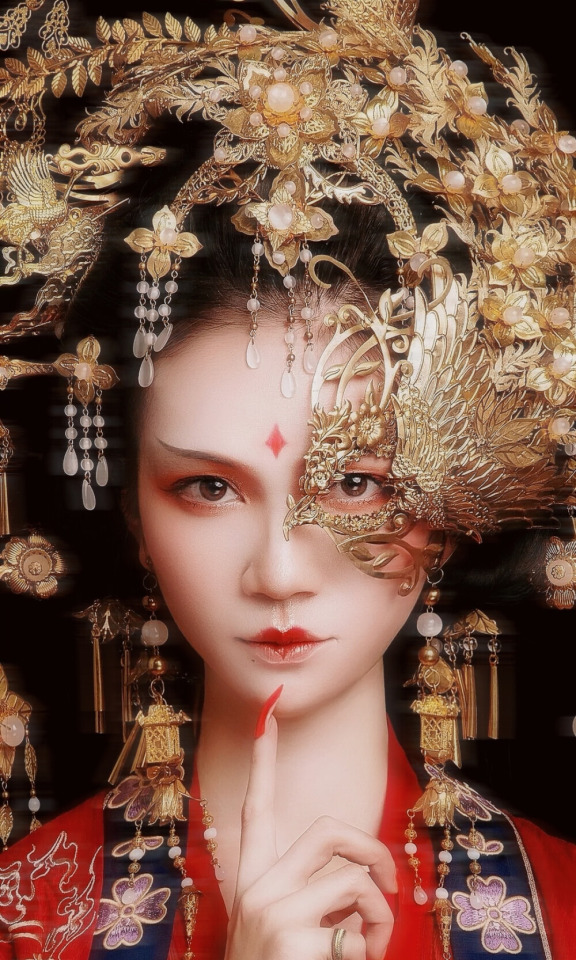
The intricate gold/metal "eye patches" covering only one eye that you see are most likely based on "半面妆/Ban Mian Zhuang" ("Half Face Makeup"), a popular Chinese novel written by 萧十一狼/Xiao Shi Yi Lang and published in 2015. Well-known Chinese gufeng-style illustrator 古戈力/Gu Ge Li provided beautiful artwork for the novel, as seen below (1, 2):
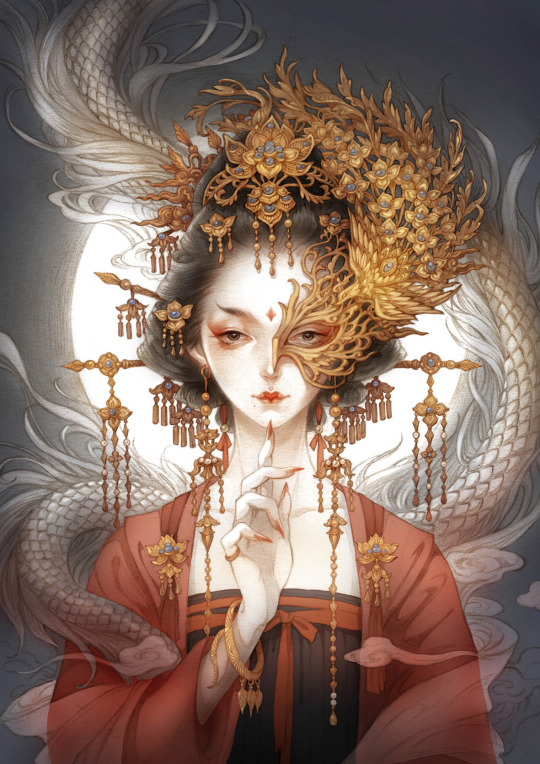
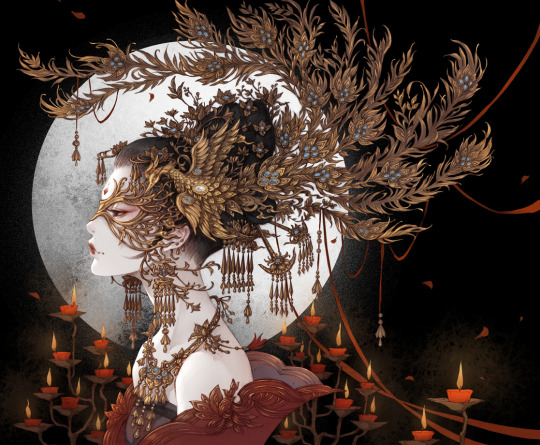
Gu Ge Li's artwork inspired many hanfu photoshoots with ornate eyemasks (1, 2, 3, 4, 5):
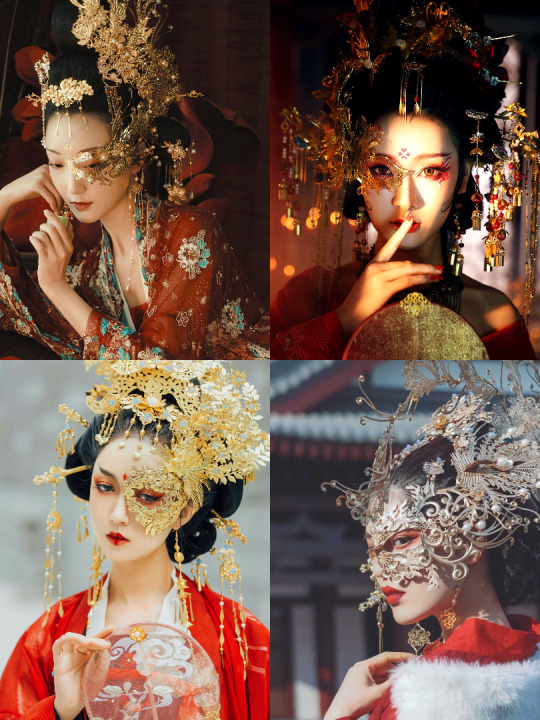
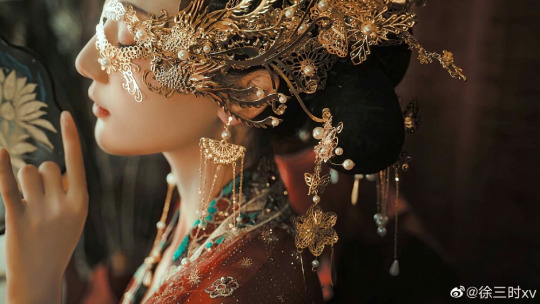
These eyemasks are essentially made-up fantasy masks with Chinese elements incorporated into the design. They are not based on historical Chinese masks, which look very different. Thus you can just call them 面具/mianju, which is the general Chinese term for masks.
On a related note, similar types of fantasy masks also appear frequently in Chinese guzhuang (period costume) films & dramas, especially in the wuxia and xianxia genres. As @audreydoeskaren touched on in this post, these masks are typically not historically accurate, but are included for aesthetic effect (like many other elements in guzhuang media).
Below - fantasy masks in Chinese film/dramas. Clockwise from top left: women - Painted Skin: The Resurrection, Legend of Nine Tails Fox, The Empress of China, The Blue Whisper; men - Love and Redemption, Xuan-Yuan Sword: Scar of Sky, The Untamed, Battle Through the Heavens:
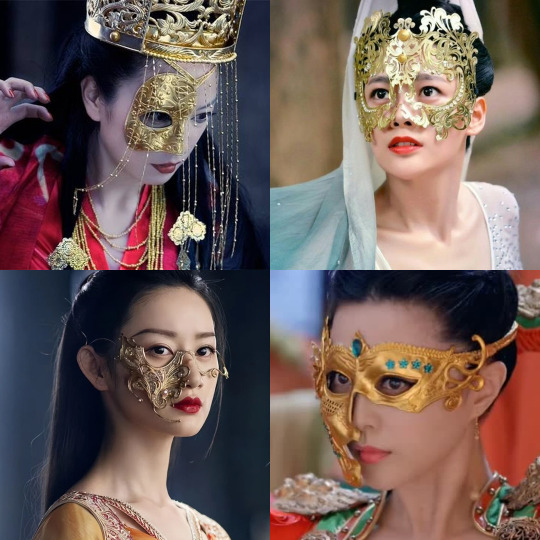
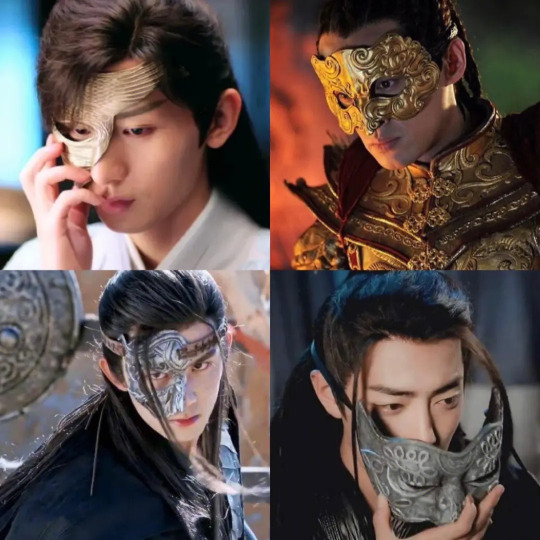
Deriving inspiration from art and television, fantasy masks have become a popular accessory for hanfu photoshoots.
For more examples of Chinese masks (both historical & fantasy), please see my masks and eyemask tags.
Hope this helps! ^^
#eyemask#masks#hanfu accessories#hanfu#半面妆#banmianzhuang#古戈力#gugeli#art#gufeng#cosplay#recreation#guzhuang#drama costumes#drama#>100#reference#ask#reply#chinese fashion#chinese clothing#china
485 notes
·
View notes
Text
“I have ascended to the apex of power. Yet the one standing by my side is not the person who has supported me and shared weal and woe with me.”

Xiao Yao isn’t only the girl who Cang Xuan imprinted on like a baby bird before his life went to shit. She’s the person who makes him feel loved. The person who was ready to assassinate their grandfather for him. She’s the only person who loves him unconditionally.
When he pressures her into coming home with him, he does it by using her fear for his safety. This is the kind of tactic you use with people who actually love you. He wouldn’t be able to use it on his empress or (in my opinion) with Ah Nian. Their love is more the desire for possession, to be doted on themselves.






No wonder he’s smiling here. No wonder he’s so happy to have her back. Someone who continually puts his wellbeing above their own happiness is rarer than gold in the life he’s led.


48 notes
·
View notes
Text





"Why do you always avoid looking at me, my empress?"
ARE YOU THE ONE (2024) - EP. 25
CHANG HUA SEN as ZI YU & YUAN YU XUAN as SHI XUEJI
#cdramaedit#cdrama#dailyasiandramas#are you the one#areyoutheoneedit#chinese dramas#chinese historical drama#chang hua sen#yuan yu xuan#zi yu#shi xueji#chang huasen#yuan yuxuan#jina makes gifs#jinatheonegifs#hidden charm#柳舟记#chinese drama#i have to break down this scene into parts because!!#their micro expressions!!#their scenes are so quiet and yet speak volumes#i love them sososo much#frankly even more than the main couple
37 notes
·
View notes
Note
Hi, could you talk about the marriage of imperial princes? Specifically the children of the current emperor. We can see this in Ruyi (it's been a while since I watched and forgive any mistakes) when Hongli was still a prince he had the ability to "choose" his wife, no matter how much Noble Consort Xi influenced him to choose Lady Fucha. Later we see him agreeing to Noble Consort Jia's request to marry Yongcheng to Prince Heyi's daughter, I can't forget Yonghuang who was resentful that his wife was from a lower flag. So I had this doubt, why did some princes have this opportunity to "choose" while others didn't?
sorry for my english
Well, choose is a strong word.
There is a distinction between the circumstances where Hongli chooses his wife and Yongcheng choosing his wife.
Ok, the ceremony we see where Hongli(‘s mother) choose Langhua, Xiyue and Hongli chooses Qingying as his wife is part of a much larger ritual, called xuan xiunu (selecting honoured ladies). Xuan xiunu is a ritual that takes place every three years, and in dramas it’s usually to select new concubines for the emperor (i.e. how Zhen Huan, Meizhuang et al. were selected). However, in reality, xuan xiunu is not just to choose wives for the emperor, it’s a much more complex process to select:
Yes, potential new concubines for the emperors
But also wives for princes and imperial relatives who the emperor may want to bestow (usually political) marriages on
But also high ranking maids to serve in positions close to women of the imperial family, including current consorts, consort dowagers, empress dowager etc. There are levels to being palace maids, and the highest level dealing closely with ranked persons would be more akin to positions of ladies in waiting, which in western history were also high-ranked women chosen to serve the Queen (in this case also high ranking imperial consorts and the empress).
(Contrary to what is portrayed in dramas, you can't just beat palace maids to death nilly willy with no repercussions like Hua Fei with Fuzi, especially maids who were serving close to higher ranks. There are consequences - see Qianlong's Dun Fei.)
There is a short subplot early in Bu Bu Jing Xin where Ruoxi, the daughter of a general and sister to the Eighth Prince’s secondary consort, is supposed to be a candidate in the xuan xiunu ceremony. While the Eighth Prince was able to use his connections to get her out of the list to be potential concubine to the emperor (Kangxi) and for marriages to the princes, she was nevertheless chosen for a guannuzi position serving the emperor himself.
(There’s a whole comedy of errors where the goal actually was to get Ruoxi to be not chosen for any position at all, but then too many princes suddenly took an interest in getting her out of lists that the consorts dealing with the selection started getting suspicious and competitive among themselves on who gets to keep her and then she becomes the emperor’s maid anyway, which they had been desperate to avoid because even though Kangxi hasn’t shown any romantic interest in Ruoxi, never say never.)
Guannuzi is a position that can potentially become a concubine to the emperor – a palace maid raised to the position of guannuzi can wait on the emperor overnight and in harem drama it’s equal to basically becoming the emperor’s concubine in all but name. Yu Ying’er and Songzhi in Legend of Zhen Huan were both raised from palace maids to guannuzi for this reason. But in BBJX it’s made clear that the position itself doesn’t have to be a concubine position, and Ruoxi was just the emperor’s tea maid.
High ranking maids like Ruoxi (and I guess dowry maids of the consorts we see in dramas like Ruyi and Zhen Huan) could be bestowed good marriages later as reward for their service as well.
Anyway. Back to Hongli. His wives were chosen in the xuan xiunu ceremony because the time of marriage happened to fall on the same period as a xuan xiunu ceremony was taking place. And by the time you get to that shortlist who gets to meet Xi Fei, there has already a whole load of selection and cuts being made off-screen. Everyone knows going in that both the Emperor and Xi Fei thinks Langhua is most suitable and the whole selection on Hongli’s part is jus ceremonial. He probably deludes himself into thinking he did have a right to choose Qingying/Ruyi if he wanted to, but honestly it would have been a bad move politically. At that point, even Yongzheng probably didn’t want him to choose Qingying, who has already been rejected by Hongshi. If disaster hadn’t struck with Hongshi and Ruyi’s aunt at that point, driving Qingying’s family into disgrace, if Hongli had insisted on choosing Qingying in that moment against his mother’s clear wishes, Xi Fei wouldn’t be able to say anything against it as at that point, Qingying was the empress’s niece. But it would not have been a good political move on his part and would have made things bad for Qingying anyway.
With Yongcheng, he is of an age to be married, but no xuan xiunu ceremony was due any time soon, in that case the emperor can just choose someone(‘s daughter) that he knows to bestow in marriage on his sons – same for Yongqi. Yuyan knew that Qianlong was thinking about Yongcheng’s marriage at that point, so she not so slyly suggested who she wanted, without realising that she was challenging the emperor in doing that and showing herself to be too arrogant for her own good. I think the idea was that Qianlong had someone lower in mind for Yongcheng but Yuyan thought that only a woman descended from Kangxi’s daughter was suitable. Yongcheng didn’t resent his wife for being lowborn, he resented his wife for being too high born and feeling like she shouldn’t be paying respect to a disgraced concubine, even though she still owes that to Yuyan as her mother in law regardless.
I think in the novel, Qianlong also deliberately chose women from lower ranking clans for both Yonghuang and Yongqi in hope that it would not make it too obvious how he was considering them both at different points as heirs (probably learning from his own situation where it was obvious where he was headed with Langhua being chosen as his consort), but it was Yonghuang that had a problem with that as well IIRC.
20 notes
·
View notes
Text
One of the things I find so interesting is how Jing is so very much not what a FL’s endgame love interest, especially in an epic xianxia, looks like (I mean in terms of character and narrative, not physical looks. Deng Wei is a ridiculously handsome man, like the rest of XY’s choices.)
I wonder if that is where at least some of puzzlement over XY’s choice/dislike of Jing as endgame that I’ve seen come from.
Jing is NOT the male lead - that is Cang Xuan, XY’s cousin who she never has even a glimmer of romantic feeling or attraction to. But Jing is also not the biggest badass or most magically powerful or most ambitious or with most status or most grand gestures or most epic story or even most outsize interaction with FL (vampy took her on dates to freaking underwater with his magic while Jing got her a practical gadget to use to go underwater herself; Vampy gave up one of his nine lives to heal her; Jing was only able to preserve her body so it would not be beyond saving and also try to die himself. Vampy’s power is battle while Jing is a tracker. Jing’s love is all-consuming and devoted but it’s also quiet.)
Jing does not come out first in anything except possibly torture (tho honestly that’s a bit of an open season on that one) and abnegation for FL’s sake. I mean the three guys are (future) emperor, a legendary rebel general with nine lives and an insane amount of magic and a…wealthy merchant.
And in a lot of ways it goes against the accepted usual narrative. Of course the top alpha dog would get the FL - the biggest bestest dude!!!! There are not many dramas where FL ends up not with ML and the ones I can think of still have a guy with outsize power/not that quiet/unhinged charisma - think of Ji Chang Wook in Empress Ki for example. The closest I can think of is in The King Loves also based on a novel where FL did not end up with the royal ML but the SML, the quiet royal bodyguard (but even there Rin was the best fighter in the drama.)
And of course the other thing that reinforces this whole departure from the usual narrative and can drive frustration is if you look at the three arcs/obstacles to FL for the three men. Cang Xuan is freaking fighting and scheming to win an empire! And accepting the whole drama maxim “love is never fated for an emperor.” Vampy is literally a sworn enemy of XY’s brother and fights to restore the long-defunct kingdom. So we have a would be emperor and a rebel leader. And then Jing’s problem is getting out of his engagement to an awful woman to be free to marry XY and/or leaving his monster family and abandoning his name to follow XY. I can see someone going “that’s nothing!”
BUT!
I love the narrative for getting that to a person living it, it’s all-consuming but also sticking to its guns that who XY will end up with is not about the usual tropes but what makes sense for her as a character. And so there is a reason Cang Xuan is the ML but Jing is the endgame and she does not end up with Vampy either. Cang Xuan’s wishes and plans drive the plot but that is precisely both why Jing is secondary in the plot but the one XY picks - she wants someone who will not drive the plot because what she wants is someone she wants cottagecore life with and there is no plot in cottagecore. The very fact that all Jing yearns for and all he fights for is domestic bliss (a traditionally FL obsession) - even all his scheming to help CX ascend is because he wants to assist FL’s desires - is why she ends up with him.
As she pretty much point blank stated in 33, everyone in her life put her second to a great cause and she’s done with that. The girl does not want a man who will change the world, she wants someone who is content to live in it with her.
ETA: I keep saying it but what the audience would pick in her place remains irrelevant. I mean I would not pick any of the three myself - I don’t feel like eternally sharing my man with 100 women as anyone with Cang Xuan would have to, Vampy’s greatest desire is to perish in the fight and the lack of appeal of that as a dating quality is obvious, and with his fam, marrying Jing would be like marrying into the Manson Family. But I am not XY so here we are.
115 notes
·
View notes
Text
The Rebel Princess Gave Me Everything I Wanted from a Court Intrigue Drama
Hello, friends. I am once again here to praise a heterosexual drama. I'm shocked as much as you. This time @lurkingshan created enough curiosity in me that I didn't charge her any of her recommendation tickets, and she got me to watch 68 episodes of people determined to fuck Zhang Zi Yi's character Wang Xuan.
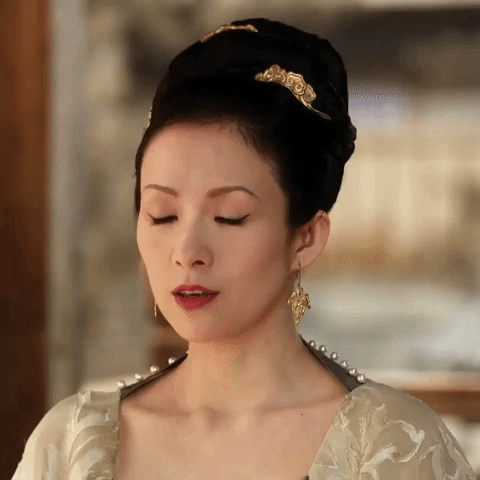
This show gave everything that shows like Game of Thrones thought they were giving. It was such a relief to watch a show where everyone had clear goals and went about them in fairly sensible ways. On the real, though, almost every character's primary motivation for doing anything is because they wanna fuck the most eligible daughter of the Wang clan, even in the final episode. I couldn't believe it!

I had a great time with this show! It gave me some of the most competent characters I've ever seen, and the primary couple works really well together. The hardest thing for me with this show (other than the heterosexuality) was the fact that they didn't let Zhang Zi Yi play a martial artist. This is the girl who stole the Green Destiny. This is the girl throwing knives across fields and around trees. They wanted me to believe she could only rely on her wits!
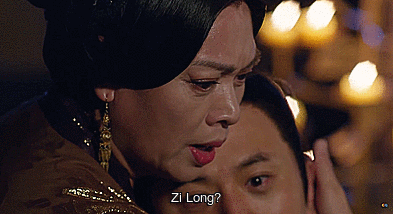
This show had some incredible characters. We had the Empress Dowager, who is always mad that no one likes her even as she's trying to force people to surrender to her will. I'm so glad she's not on twitter.
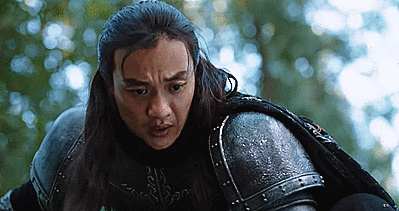
We had her song, Zilong, who has probably the most compelling arc in the show. He was a useless little shit early on, but he was actually growing into the role of emperor and was one of the few characters in power to actually care about the health and stability of the nation.

There's Ma Zilu, aka The Brothel Prince. He was my favorite villain. He was the only villain not focused on who got to fuck his cousin/sister and for that I respect him the most. He also had an incredible cackle. Look at him stabbing his own brother to stab Xuan.
There's Yu Xiu, my favorite girl of all time. I just need her to know that she did well in the interview. All of Ningshuo Army. Pan Gui, my beloved.
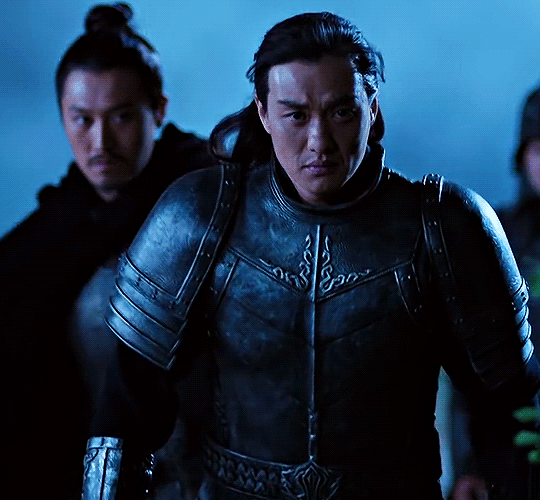
There's an incredible cast. I don't want to go on naming all of them, because truly the character I loved the most was Xiao Qi. This man was genuinely good in a way we so rarely get in these intrigue dramas. He's loyal, powerful, and competent. He cares about the state of the world and aspires to no higher position than is necessary to accomplish the mission. Then he surrenders his power and tries to go home. He loves and respects his wife, promises to marry only her, and chooses not to have children to make sure she doesn't risk dying in childbirth.
This show is full of some incredible battle sequences that are some of the most satisfying I've ever experienced in TV. They spend their money efficiently, but they build the emotions so well that every time we are seeing combat we can feel the stakes. It's been so long since I watched a show with good Warrior's Bond content, and I was compelled by this show once it really got rolling.
Still, as much as I loved this show and highly recommend it, I will not be watching another drama anytime soon with this much heterosexuality in it.
31 notes
·
View notes
Note
Sima YEET
(I'll see myself out.)

1 note
·
View note
Text
HAS ANYONE WRITTEN AN ANASTASIA AU OF TGCF BCS CONSIDER:
Xie Lian as Anastasia
Hua Cheng as Dmitri
He Xuan as Vlad
Feng Xin and Mu Qing as Dowager Empress Marie
Shi Qingxuan as Sophie
Jun Wu as Rasputin
Qi Rong as Bartok
SOMEONE PLS WRITE THIS BCS IF NOT I WILL BE FORCED TO WRITE IT MYSELF AND I WILL BUTCHER IT CAUSE I AM FAILING ENGLISH
#tgcf#tian guan ci fu#xie lian#disney anastasia#hua cheng#hualian#feng xin#mu qing#fengqing#he xuan#shi qingxuan#beefleaf#anastasia au#feng xin and mu qing being xie lians childhood best friends and putting up a reward for his return#hua cheng and he xuan as con men coming across garbage picker xie lian and being excited#hualian slowly blooming#hx and sqx having a background romance#feng xin and mu qing are enemies and reluctant allies but are totally acting like theyre married
59 notes
·
View notes
Text
[Hanfu · 漢服]The relationship between women in history is not just love rivals,
“but also thousands of years later, everyone knows that it is me and you.”
Let's get to know about them/她们 in China history.
1.【Han Dynasty】:Princess Jieyou (解忧公主) & Feng Liao (馮嫽)
Princess Jieyou (Chinese: 解忧公主; 121 BC – 49 BC), born Liu Jieyou (Chinese: 刘解忧), was a Chinese princess sent to marry the leader of the Wusun kingdom as part of the Western Han Chinese policy of heqin(和亲).
As the granddaughter of the disgraced Prince Liu Wu (劉戊) who had taken part in the disastrous Rebellion of the Seven States,her status was low enough that she was sent to replace Princess Liu Xijun (劉細君) after her untimely death and marry the Wusun king Cunzhou (岑陬).
Jieyou lived among the Wusun for fifty years and did much work to foster relations between the surrounding kingdoms and the Han. She was particularly reliant upon her attendant, Feng Liao, whom she dispatched as an emissary to Wusun kingdoms and even to the Han Court. She faced opposition from pro-Xiongnu members of the Wusun royalty, particularly Wengguimi’s Xiongnu wife. When word came that the Xiongnu planned to attack Wusun, she convinced her husband to send for aid from the Han Emperor. Emperor Wu of Han sent 150,000 cavalrymen to support the Wusun forces and drive back the Xiongnu.
In 51 BCE at the age of 70, Jieyou asked to be allowed to retire and return to the Han. Emperor Xuan of Han agreed and had her escorted back to Chang'an where she was welcomed with honor. She was given a grand palace with servants usually reserved for princesses of the imperial family. In 49 BCE, Jieyou died peacefully.
Feng Liao (馮嫽)
Feng Liao (馮嫽) was China's first official female diplomat,[citation needed] who represented the Han dynasty to Wusun (烏孫), which was in the Western Regions. It was a practice for the Imperial Court to foster alliances with the northern tribes via marriage, and two Han princesses had married Wusun kings.
Feng Liao was the maidservant of Princess Jieyou (解憂公主), who was married off to a Wusun king. Feng herself later married an influential Wusun general, whose good standing with Prince Wujiutu (烏就屠) of the kingdom later proved beneficial to the Han dynasty.
When Prince Wujiutu seized the throne of Wusun in 64 BC, after his father died, there was fear in the Imperial Court of Han that Wujiutu, whose mother was Xiongnu, would allow Wusun to become Xiongnu's vassal.
Zheng Ji, Governor of the Western Regions, recalled that Feng Liao had married into Wusun and with her familiarity of the Wusun customs, she was a prime candidate to persuade Wujiutu to ally his kingdom with Han. Wujiutu acceded and Emperor Xuan of Han (漢宣帝) sent for Feng. He praised her for her judgement and diplomacy, and appointed her as the official envoy to Wusun.
Wujiutu was conferred the title "Little King of Wusun" while his brother, the son by a Han princess, was named "Great King of Wusun". Wusun was divided between the two kings and tensions in that region were eased.
※Xiongnu: Xiongnu: A nomadic tribe that has occupied northern China for a long time. Later it gradually became a state. It harassed the borders of the Han Dynasty for a long time and robbed supplies.
------
With their efforts, the Wusun Kingdom gradually tended to support the Han Dynasty, and the Xiongnu's defeat in China also began.
------
2.【Tang Dynasty】:Shangguan Wan'er(上官婉儿)&Princess Taiping (太平公主)
Shangguan Wan'er/上官婉儿 (664 – 21 July 710) was a Chinese politician, poet, and imperial consort of the Wu Zhou and Tang dynasties. Described as a "female prime minister,"Shangguan rose from modest origins as a palace servant to become secretary and leading advisor to Empress Wu Zetian of Zhou. Under Empress Wu, Shangguan exercised responsibility for drafting imperial edicts and earned approbation for her writing style. She retained her influence as consort to Wu's son and successor, Emperor Zhongzong of Tang, holding the imperial consort rank of Zhaorong (昭容). Shangguan was also highly esteemed for her talent as a poet.Shangguan was also highly esteemed for her talent as a poet. In 710, after Emperor Zhongzong's death, Shangguan was killed during a palace coup that ended the regency of Empress Dowager Wei.
Princess Taiping (太平公主)lit. "Princess of Great Peace", personal name unknown, possibly Li Lingyue (李令月) (after 662 – 2 August 713) was a royal princess and prominent political figure of the Tang dynasty and her mother Wu Zetian's Zhou dynasty. She was the youngest daughter of Wu Zetian and Emperor Gaozong and was influential during the reigns of her mother and her elder brothers Emperor Zhongzong and Emperor Ruizong (both of whom reigned twice), particularly during Emperor Ruizong's second reign, when for three years until her death, she was the real power behind the throne.
She is the most famous and influential princess of the Tang dynasty and possibly in the whole history of China thanks to her power, ability and ambition. She was involved in political difficulties and developments during the reigns of her mother and brothers. Indeed, after the coup against Empress Dowager Wei, she became the real ruler of Tang. During the reign of Emperor Ruizong, she was not restricted by anything, the emperor issued rulings based on her views and the courtiers and the military flattered her and majority from every civil and military class joined her faction, so her power exceeded that of the emperor.
Eventually, however, a rivalry developed between her and her nephew, Emperor Ruizong's son, Crown Prince Li Longji. Both of them were hostile in power-sharing and they fought for the monopoly over power. After Emperor Ruizong yielded the throne to Li Longji (as Emperor Xuanzong) in 712, the conflict came to the political forefront, and openly, the court became a manifestation of conspiracy rather than the administration of the empire; in 713, Emperor Xuanzong, according to historical records, believing that she was planning to overthrow him, acted first, executing a large number of her powerful allies and forcing her to commit suicide.
------
The relationship between Shangguan Wan'er and Princess Taiping has always been written as "enemies" in official history, but with the phrase "千年万岁,椒花颂声", their friendship that has been buried for thousands of years was revealed.
The"千年万岁,椒花颂声" sentence comes from the epitaph written by Princess Taiping for Shangguan Wan'er. The original text is: "潇湘水断,宛委山倾,珠沉圆折,玉碎连城。甫瞻松槚,静听坟茔,千年万岁,椒花颂声”
Translation: Now that you are far away, the sky and the earth will lose their color. I'm afraid that all I can do in the future is to sit and look at the tea tree in front of your tomb. Maybe I can hear your voice again when I stand within an inch of the tomb. But this is a delusion after all, a quiet tomb, no beautiful face, a empty place of death. I hope that in a thousand or ten thousand years, there will still be people like me who remember you.
------
3.【Late Qing Dynasty】:Lü Bicheng(呂碧城) & Qiu Jin (秋瑾)
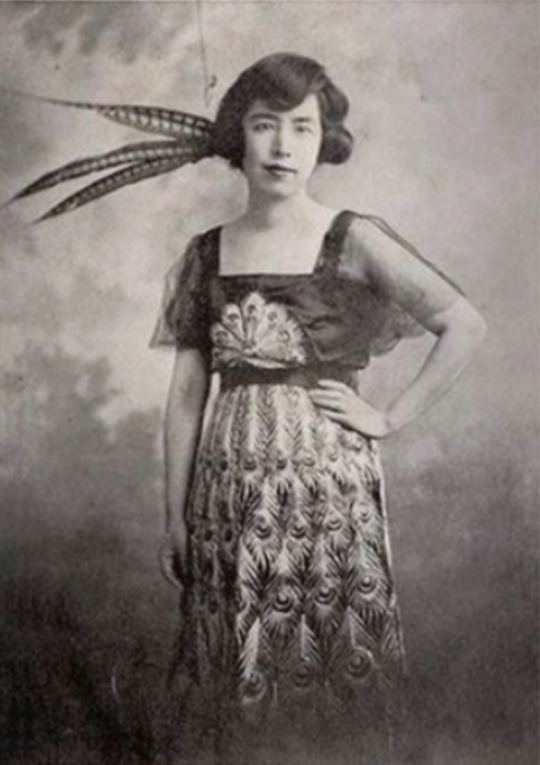
Lü Bicheng(呂碧城)also known as Alice Pichen Lee(1883–1943) was a Chinese writer, activist, newspaper editor, poet and school founder. She has been mentioned as one of the top four women in literature from the early Republic of China.
When she was four, her father retired to Lu'an, Anhui. She lived a life of comfort until the age of 12, when her father died in 1895. Because Lü Fengqi had no male heir, relatives of the Lü lineage contested for his inheritance, and Yan Shiyu and her four daughters were forced to move to Lai'an County to live with her natal family. When she was nine, Lü Bicheng was betrothed to a Wang family, but as her own family fortune declined, the Wang family broke off the marriage contract, giving the young Bicheng the stigma of a "rejected woman". The resulting emotional scar is often considered a major factor in her later decision to never marry.[8] Her widowed mother and the Lü girls were not well treated at the Yan family in rural Anhui. When Lü was 15 or 16, Yan Shiyu sent her to live with her maternal uncle Yan Langxuan (嚴朗軒), who was the salt administrator in Tanggu, the port city outside the northern metropolis of Tianjin. Her sister Huiru also joined her later.
During her stay in Tanggu, Qing China went through the tumultuous period of the failed Hundred Days' Reform of 1898, which brought about increasing awareness of women's education, and the Boxer Rebellion of 1900. In 1904, Mrs. Fang, the wife of her uncle's secretary, invited Lü Bicheng to visit a girls' school in Tianjin, but her uncle prevented her from going and severely reprimanded her. The next day, she ran away from her uncle's home, and took the train to Tianjin with no money or luggage. She wrote a letter to Mrs. Fang, who was staying at the dormitory of the Ta Kung Pao newspaper. Ying Lianzhi, the Catholic Manchu nobleman who founded the newspaper, read the letter and was so impressed by it that he made her an assistant editor. Lü Bicheng wrote a "progressive" ci that she had previously written, set to "A River Full of Red" ("Manjianghong") usually used to express heroic emotions. Ying transcribed the whole song in her diary and published it in L'impartial two days later. At the time, it was sensational for a woman to write for an influential national newspaper such as Ta Kung Pao. She was 21 years old. She used Ta Kung Pao to promote feminism and became a well-known figure.
Lü's ci poetry was published in the newspaper and it was very well received. She was the chief editor of the newspaper from 1904 to 1908. In 1904 she decided to improve education for girls. She had published her thoughts on women's rights and the general editor of the newspaper introduced her to Yan Fu who was an advocate for Western ideas. The Beiyang Women's Normal School was established that same year. At 23 Lü took on the job of principal of the school she had founded two years before. At first this school found it difficult to find girls who qualified for secondary education and students were brought in from Shanghai to make up the numbers.
Lü knew the revolutionary Qiu Jin and they had similar objectives but Lü did not join her in Japan when she was invited as she was unsure whether women should meddle in politics. She was then chosen to be secretary to Yuan Shikai, one of the most powerful people in China. When he set out to declare himself emperor of China she left, like many of his followers, and abandoned him.
--

Qiu Jin (秋瑾)8 November 1875 – 15 July 1907,was a Chinese revolutionary, feminist, and writer.Her sobriquet name is Jianhu Nüxia (Chinese: 鑑湖女俠 lit. 'Woman Knight of Mirror Lake').
Qiu was born into a wealthy family. Her grandfather worked in the Xiamen city government and was responsible for the city's defense. Zhejiang province was famous for female education, and Qiu Jin had support from her family when she was young to pursue her educational interests. Her father, Qiu Shounan, was a government official and her mother came from a distinguished literati-official family. Qiu Jin's wealthy and educated background, along with her early exposure to political ideologies were key factors in her transformation to becoming a female pioneer for the woman's liberation movement and the republican revolution in China.
In the early 1900s, Japan had started to experience western influences earlier than China. As to not fall behind, the Qing government sent many elites to learn from the Japanese. Qiu Jin was one of these elites that got the chance to study overseas. After studying in a women's school in Japan, Qiu returned to China to participate in a variety of revolutionary activities; and through her involvement with these activities, it became clear how Qiu wanted others to perceive her. Qiu called herself 'Female Knight-Errant of Jian Lake' — the role of the knight-errant, established in the Han dynasty, was a prototypically male figure known for swordsmanship, bravery, faithfulness, and self-sacrifice — and 'Vying for Heroism'
Qiu Jin had her feet bound and began writing poetry at an early age. With the support from her family, Qiu Jin also learned how to ride a horse, use a sword, and drink wine—activities that usually only men were permitted to learn at the time.In 1896 Qiu Jin got married. At the time she was only 21, which was considered late for a woman of that time. Qiu Jin's father arranged her marriage to Wang Tingchun, the youngest son of a wealthy merchant in Hunan province. Qiu Jin did not get along well with her husband, as her husband only cared about enjoying himself.While in an unhappy marriage, Qiu came into contact with new ideas. The failure of her marriage affected her decisions later on, including choosing to study in Japan.
While still in Tokyo, Qiu single-handedly edited a journal, Vernacular Journal (Baihua Bao). A number of issues were published using vernacular Chinese as a medium of revolutionary propaganda. In one issue, Qiu wrote A Respectful Proclamation to China's 200 Million Women Comrades, a manifesto within which she lamented the problems caused by bound feet and oppressive marriages. Having suffered from both ordeals herself, Qiu explained her experience in the manifesto and received an overwhelmingly sympathetic response from her readers. Also outlined in the manifesto was Qiu's belief that a better future for women lay under a Western-type government instead of the Qing government that was in power at the time. She joined forces with her cousin Xu Xilin and together they worked to unite many secret revolutionary societies to work together for the overthrow of the Qing dynasty.
Between 1905 and 1907, Qiu Jin was also writing a novel called Stones of the Jingwei Bird in traditional ballad form, a type of literature often composed by women for women audiences. The novel describes the relationship between five wealthy women who decide to flee their families and the arranged marriages awaiting them in order to study and join revolutionary activities in Tokyo. Titles for the later uncompleted chapters suggest that the women will go on to talk about “education, manufacturing, military activities, speechmaking, and direct political action, eventually overthrowing the Qing dynasty and establishing a republic” — all of which were subject matters that Qiu either participated in or advocated for.
Life after returning to China
Qiu Jin was known as an eloquent orator who spoke out for women's rights, such as the freedom to marry, freedom of education, and abolishment of the practice of foot binding. In 1906 she founded China Women's News (Zhongguo nü bao), a radical women's journal with another female poet, Xu Zihua in Shanghai. They published only two issues before it was closed by the authorities. In 1907, she became head of the Datong school in Shaoxing, ostensibly a school for sport teachers, but really intended for the military training of revolutionaries[citation needed]. While teaching in Datong school, she kept secret connection with local underground organization—The Restoration Society. This organization aimed to overthrow the Manchu government and restore Chinese rule.
Death
In 1907, Xu Xilin, Qiu’s friend and the Datong school’s co-founder was executed for attempting to assassinate his Manchu superior. In the same year, the authorities arrested Qiu at the school for girls where she was the principal. She was tortured but refused to admit her involvement in the plot. Instead the authorities used her own writings as incrimination against her and, a few days later, she was publicly beheaded in her home village, Shanyin, at the age of 31. Her last written words, her death poem, uses the literal meaning of her name, Autumn Gem, to lament of the failed revolution that she would never see take place:
秋風秋雨愁煞人
(Autumn wind, autumn rain — they make one die of sorrow)
After Qiu Jin was killed, no one dared to collect her body. Lu Bicheng endured her grief and took great risks to bury her friend. The guarding Qing army learned that the woman who came to collect the corpse was Lu Bicheng, who was famous in China, and they had no choice but to do anything.
Qiu Jin's death caused Lu Bicheng to lose a rare confidant in life. She wrote many poems in memory of Qiu Jin, recalling this like-minded friend.
Later, Lü Bicheng wrote "The Biography of the Revolutionary Heroine Qiu Jin" in English, which was published in newspapers in New York, Chicago and other places in the United States. It caused a great response and not only made many people in the world know about Qiu Jin's legendary story, but also published it in newspapers in New York and Chicago. It also makes people understand the darkness and corrupt social status quo of the Qing Dynasty. Lu Bicheng used a pen of her own to record her friendship with Qiu Jin, and also fulfilled her promise to Qiu Jin to respond with the "battle of words"
————————
📸Video & 🧚🏻 Model:@荷里寒 & @阿时Ashi_
🔗Weibo:https://weibo.com/3618951560/NEZZnpQRq
————————
#chinese hanfu#china history#woman power#woman in history#hanfu#hanfu accessories#hanfu_challenge#chinese traditional clothing#china#chinese#han dynasty#tang dynasty#late qing dynasty#feminism#revolution#漢服#汉服#中華風#girl power#hanfu girl
383 notes
·
View notes
Text
Best Character surnamed: Liu
Come and vote for the best characters with the same surname!*
What does best mean? It's up to you! Whether you love them, are intrigued by their characters, love to hate them, or they're your '2 second blorbos whose personality you made up wholesale', these are all reasons for you to vote for your favs!
*note, the surnames are not exactly the same in all the cases, as often there will be a different character. I am, however, grouping them all together otherwise things got more complicated.
Propaganda is very welcome! If I’ve forgot anyone, let me know in the notes.
This is part of a larger series of ‘best character with X surname’ polls’. The overview with ongoing polls, winners, and future polls can be found here
#poll#the scum villain's self saving system#word of honor#oh my general#love and redemption#wonderland of love#the myth#romance of the three kingdoms#maiden holmes#serenade of peaceful joy#the blooms at ruyi pavilion#miss s
45 notes
·
View notes